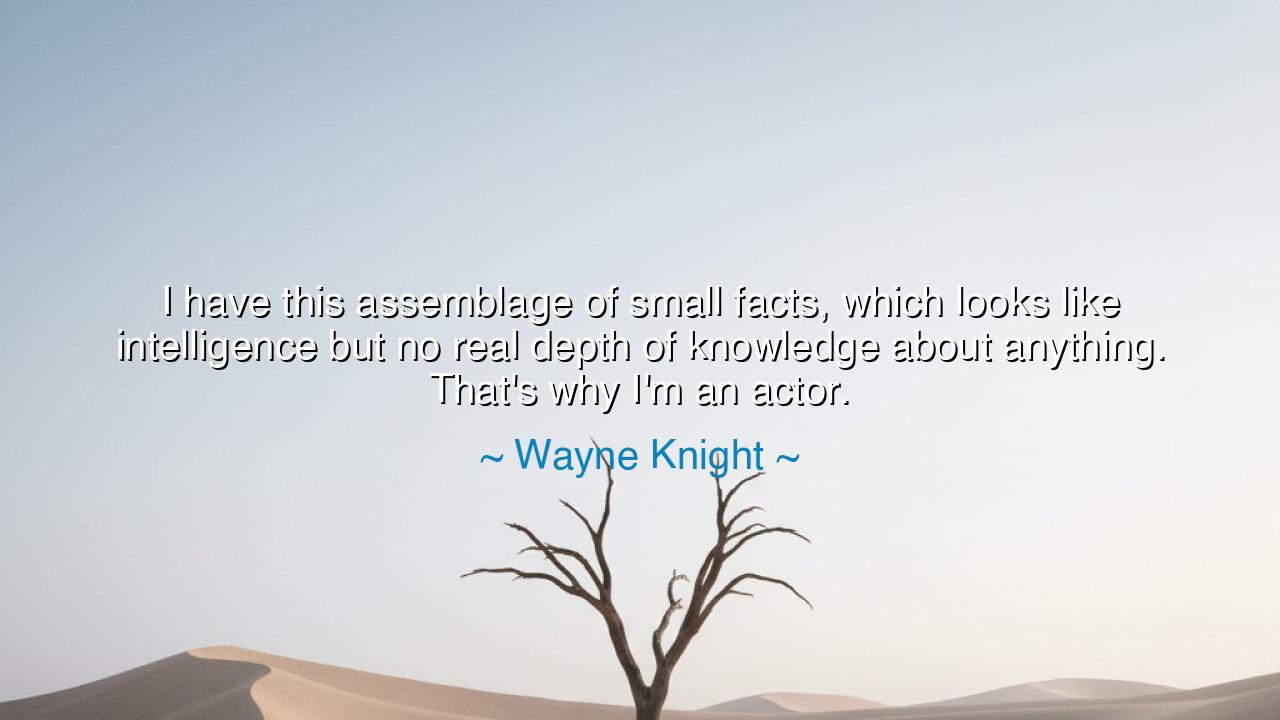
I have this assemblage of small facts, which looks like
I have this assemblage of small facts, which looks like intelligence but no real depth of knowledge about anything. That's why I'm an actor.






The words of Wayne Knight, actor and storyteller, carry a rare humility wrapped in humor: “I have this assemblage of small facts, which looks like intelligence but no real depth of knowledge about anything. That’s why I’m an actor.” Beneath this self-effacing wit lies a profound meditation on the nature of artistry, knowledge, and the human condition itself. Knight, known to many as a figure of laughter, here reveals a wisdom that belongs not only to the stage, but to life — that the actor’s craft, and indeed all human experience, is built not upon the accumulation of vast learning, but upon the capacity to understand fragments and to breathe life into them.
When he speaks of an “assemblage of small facts,” Knight paints the picture of a mosaic — countless tiny pieces that, when viewed together, form the illusion of wholeness. This is the actor’s gift: to know a little of everything — a touch of history, a hint of psychology, the mannerisms of a soldier, the sorrows of a poet — and from these fragments, to create the appearance of depth. Yet in his modest confession, he reveals the paradox of the actor’s genius: he may not possess the scholar’s storehouse of knowledge, but he carries the instinct to feel what knowledge alone cannot reach. His intelligence lies not in accumulation, but in empathy — the divine ability to step into another soul and speak as though he has lived a thousand lives.
From the beginning of civilization, the actor has been the vessel through which humanity has seen itself. In ancient Athens, the dramatists of the Dionysian festivals believed that actors channeled the voices of gods and heroes. The mask they wore was not deceit, but transformation. Like Knight’s words, this art was not about mastery of fact, but the power to embody truth. The actor does not need to know every detail of a life to portray it with honesty — he must only listen deeply, observe keenly, and surrender to imagination. Thus, the “assemblage of small facts” becomes a bridge to something greater: the illusion that feels real, the imitation that becomes revelation.
Yet Knight’s statement also contains a subtle, timeless lesson about the limits of knowledge itself. In our age, we prize the scholar, the expert, the one who knows deeply within one field. But life — vast, mysterious, and ever-shifting — cannot be contained within the walls of expertise. The actor’s mind, filled with fragments and impressions, mirrors the way the human heart understands the world: through glimpses, emotions, and lived moments rather than endless theory. To be alive is not to know everything, but to connect — to gather what you can, however small, and to use it to illuminate the lives of others. In this, Knight’s “lack of depth” becomes a kind of wisdom: a recognition that understanding people is more important than mastering facts.
History has often proven this truth. Think of Leonardo da Vinci, who seemed to know “a little of everything” — anatomy, music, painting, mechanics — yet his genius did not come from depth in any single field, but from his ability to weave connections among them. He lived not as a specialist but as a universal observer, finding unity among fragments. Or consider Shakespeare, who was no scholar of science or history, yet wrote with such understanding of the human heart that kings and beggars alike still find themselves in his words. Like Knight, he drew upon an ocean of small truths — overheard speech, passing emotions, scraps of gossip — and from them crafted worlds that feel eternal.
In truth, intelligence itself may not always be depth, but perception — the ability to see meaning in what others overlook. The actor’s mind, filled with fleeting observations, becomes a mirror to all humanity. He collects the gestures, tones, and subtle glances that reveal the secret language of the soul. His knowledge may be scattered, but his wisdom is profound, for it is born not from books but from attention. Knight’s quote, then, is a celebration of this kind of intelligence — the intelligence of feeling, of observing, of living many lives through imagination.
And so, my children, the lesson is this: do not despair if your knowledge feels fragmented, or if your learning seems shallow beside the scholars of the world. Every small fact you gather, every moment you witness, every person you meet becomes part of your assemblage — the mosaic of your understanding. What matters is not how much you know, but how deeply you can feel what you know. Like the actor upon the stage, gather the scattered pieces of life and breathe meaning into them. For wisdom is not always a mountain — sometimes it is a field of countless shining stones, each small, but together radiant with light.
Therefore, live as Wayne Knight suggests: with curiosity, humor, and humility. Embrace your “assemblage of small facts” as a treasury of connection. Do not seek to know everything — seek to understand something deeply, even if it is only the heart of another person. For the actor’s art, and the art of living, are one and the same: to stand before the world with courage, and to make from its fragments something that feels alive.






AAdministratorAdministrator
Welcome, honored guests. Please leave a comment, we will respond soon